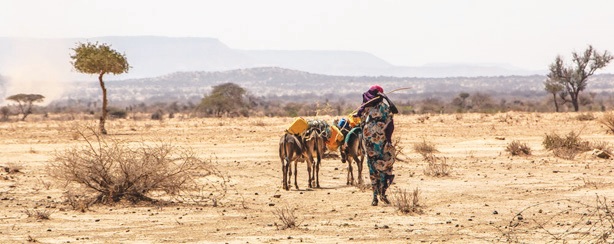
There is a severe food scarcity problem in many parts of the world, including Africa. The degree of food insecurity varies from continent to continent and country to country. Droughts have been regularly reported in some parts of Ethiopia, Somalia, Kenya, Eritrea, and Djibouti. These causes result in food shortages and severe malnutrition.
Conflicts, desertification, and unpredictable rainfall are some of the other causes of food shortages. Smallholder farmers, who frequently lack access to modern farming methods, improved seeds, and sufficient infrastructure, are a defining feature of developing countries’ agriculture. Hence, low agricultural output severely hampered food security.
Furthermore, many African nations struggle to withstand issues like land degradation, deforestation, and soil erosion. These factors reduce the amount of arable land that is available and make it challenging to maintain agricultural techniques. Lack of access to markets, food loss, and waste are other problems that challenge the promotion of food security in Africa.
Despite the aforementioned difficulties, initiatives to address the issue of food security in Africa have been made. Countries have attempted to promote sustainable and contemporary farming techniques, provide access to high-yield seeds, and construct efficient irrigation systems to increase agricultural production in their respective countries.
Taking these and other related challenges into account, Ethiopia has developed some efforts to secure nationwide food security. Green Legacy, Ye limat Tirufat, Summer Wheat Development, and other initiatives are noteworthy.
In 2019, the country’s first Ethiopian Green Legacy Initiatives were launched. The primary goal of the effort is to combat climate change, land degradation, and deforestation by planting billions of trees around the country in order to ensure food security. At the completion of the program in 2022, the nation had more than 25 billion trees, contrary to the program’s goal of planting 4 billion trees during the rainy season each year.
The second phase of the Green Legacy Initiative, which began in 2022, builds on the preceding phase’s success by intending to boost tree-planting efforts. It focuses on not just planting trees, but also caring for and maintaining them to ensure their survival and long-term impact on the environment.
Ethiopian Ministry of Agriculture (MoA) State Minister Eyasu Elias (Prof.) told The Ethiopian Herald that the green legacy program has paid off for the country by enhancing agricultural productivity and is part of the macroeconomic pie. It enabled the country to plant over 32.5 billion saplings in the last five years, with 60 percent of the seedlings being agroforestry plants grown in farmers’ backyards.
Accordingly, “Farmers who planted seedlings in their backyards have begun producing and exporting fruits, establishing Ethiopia as Africa’s biggest exporter. Similarly, the effort has enabled Ethiopia to become Africa’s second-largest avocado exporter, after Kenya.”
According to the state minister, 35 percent of the seedlings have been planted to combat flooding, land degradation, and soil erosion, among other things. This helps the country’s agriculture sector produce the necessary results while withstanding climate change. On the other hand, 5 percent of the saplings planted in cities during the last six years were chosen for both ornamental and climate change mitigation goals.
“Yelimat Tirufat” is another significant program initiated by the government to ensure food security. It is a development effort that aims to solve a variety of socioeconomic concerns, primarily those related to food security and agricultural development.
Ethiopian Minister of Agriculture Dr. Umar Hussain once remarked that the initiative was created to promote nutritional opulence. It began by producing milk, eggs, chicken meat, and honey. Its primary goals are to increase chicken meat production from 90 thousand to 296 thousand tons, milk production from 6.9 billion to 11.7 billion liters, egg production from 3.2 billion to 9.1 billion, and honey production from 147 thousand to 296 thousand tons.
He also added that to implement the “Yelimat Tirufat” program, lessons, and best practices have been taken from the Green Legacy Initiative and avocado development across the country.
Another significant government project is the Summer Wheat Irrigation Development program. In order to strengthen the current efforts to ensure the country’s food sufficiency and expand export commodities, Ethiopia has also been executing a summer wheat irrigation development.
Ethiopian Minister of Agriculture State Minister Dr. Melese Mekonnen stated that efforts are being made to increase summer wheat production. It has been widely implemented in areas where there is no prior experience. Hence, it not only boosts output and productivity but also modernizes farming and pastoralist techniques. Furthermore, efforts are underway to modernize agriculture and boost production through sustainable technology transfer.
These initiatives should be promoted and supported by the appropriate bodies. The World without Hunger Conference, which Ethiopia will host from November 5-7 in Addis Ababa, is an excellent chance to highlight the difficulties and successes of Ethiopian food security policies and efforts. The Conference is anticipated to reflect on the most serious issues of our day. It is a three-day event that includes solution-focused technical seminars, an investment forum, and a high-level political forum.
In addition, over 1,500 high-level stakeholders, including heads of state/government, ministers, UN agencies, the commercial sector, financial institutions, the donor community, DFI/IFI, civil society, non-governmental organizations, academia, and the media, will attend the conference. The conference is co-organized by the United Nations Industrial Development Organization (UNIDO), the African Union Commission (AUC), and the Ethiopian government, with technical support from the Food and Agriculture Organization (FAO). This in turn provides a good opportunity to share experiences and disclose the food security efforts of Ethiopia.
Because Ethiopia’s efforts to ensure food security through Green Legacy, Ye lemat Trufat, Summer Wheat Development, and other initiatives can demonstrate Ethiopia’s continued commitment to mitigating the negative consequences of climate change, with a stronger emphasis on sustainability, community engagement, long-term effects, and ensuring food security.
In general, implementing and replicating these initiatives not only assures national food security of the country by addressing nutrition demands through considerable increases in milk, eggs, poultry, and honey production across the country but also serves as a model for other developing countries to fight climate change while addressing food security. Moreover, presenting Ethiopia’s food security efforts has the potential to build a society in which everyone has access to adequate, safe, and nutritious food, effectively moving toward a “World Without Hunger.”
BY EPHREM ANDARGACHEW
THE ETHIOPIAN HERALD WEDNESDAY 30 OCTOBER 2024




